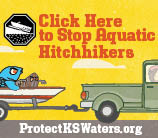License and Regulation Questions
License requirements, catch and length limits, and legal equipment answers.
For answers to further questions, view and download a copy of our fishing regulations summary here. These pages and this publication are not intended to be a complete listing of all Kansas fishing regulations.










